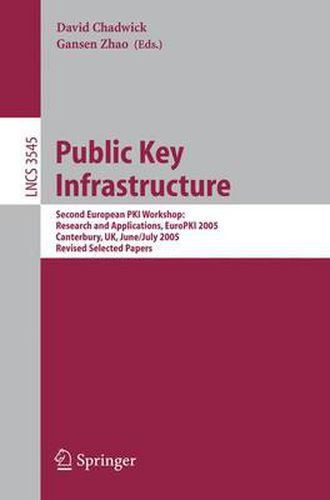Readings Newsletter
Become a Readings Member to make your shopping experience even easier.
Sign in or sign up for free!
You’re not far away from qualifying for FREE standard shipping within Australia
You’ve qualified for FREE standard shipping within Australia
The cart is loading…






This title is printed to order. This book may have been self-published. If so, we cannot guarantee the quality of the content. In the main most books will have gone through the editing process however some may not. We therefore suggest that you be aware of this before ordering this book. If in doubt check either the author or publisher’s details as we are unable to accept any returns unless they are faulty. Please contact us if you have any questions.
This book contains the proceedings of the 2nd EuroPKI Workshop - EuroPKI 2005, held at the University of Kent in the city of Canterbury, UK, 30 June-1 July 2005. The workshop was informal and lively, and the university setting encouragedactive exchangesbetween the speakersand the audience. TheworkshopprogramcomprisedakeynotespeechfromDr.CarlisleAdams, followedby18refereedpapers,withaworkshopdinnerinandguidedtouraround the historic Dover Castle. Dr. Adams is well known for his contributions to the CAST family of s- metric encryption algorithms, to international standards from the IETF, ISO, and OASIS, authorship of over 30 refereed journals and conference papers, and co-authorship of Understanding PKI: Concepts, Standards, and Deployment Considerations (Addison-Wesley). Dr. Adams keynote speech was entitled ‘PKI: Views from the Dispassionate I ,’ in which he presented his thoughts on why PKIhas been availableas an authentication technology for many years now,but has only enjoyed large-scale success in fairly limited contexts to date. He also presented his thoughts on the possible future(s) of this technology, with emp- sis on the major factors hindering adoption and some potential directions for future research in these areas. In response to the Call for Papers, 43 workshop papers were submitted in total. All papers were blind reviewed by at least two members of the Program Committee, the majority having 3 reviewers, with a few borderline papers h- ing 4 or more reviewers; 18 papers were accepted for presentation in 8 sessions.
$9.00 standard shipping within Australia
FREE standard shipping within Australia for orders over $100.00
Express & International shipping calculated at checkout
This title is printed to order. This book may have been self-published. If so, we cannot guarantee the quality of the content. In the main most books will have gone through the editing process however some may not. We therefore suggest that you be aware of this before ordering this book. If in doubt check either the author or publisher’s details as we are unable to accept any returns unless they are faulty. Please contact us if you have any questions.
This book contains the proceedings of the 2nd EuroPKI Workshop - EuroPKI 2005, held at the University of Kent in the city of Canterbury, UK, 30 June-1 July 2005. The workshop was informal and lively, and the university setting encouragedactive exchangesbetween the speakersand the audience. TheworkshopprogramcomprisedakeynotespeechfromDr.CarlisleAdams, followedby18refereedpapers,withaworkshopdinnerinandguidedtouraround the historic Dover Castle. Dr. Adams is well known for his contributions to the CAST family of s- metric encryption algorithms, to international standards from the IETF, ISO, and OASIS, authorship of over 30 refereed journals and conference papers, and co-authorship of Understanding PKI: Concepts, Standards, and Deployment Considerations (Addison-Wesley). Dr. Adams keynote speech was entitled ‘PKI: Views from the Dispassionate I ,’ in which he presented his thoughts on why PKIhas been availableas an authentication technology for many years now,but has only enjoyed large-scale success in fairly limited contexts to date. He also presented his thoughts on the possible future(s) of this technology, with emp- sis on the major factors hindering adoption and some potential directions for future research in these areas. In response to the Call for Papers, 43 workshop papers were submitted in total. All papers were blind reviewed by at least two members of the Program Committee, the majority having 3 reviewers, with a few borderline papers h- ing 4 or more reviewers; 18 papers were accepted for presentation in 8 sessions.